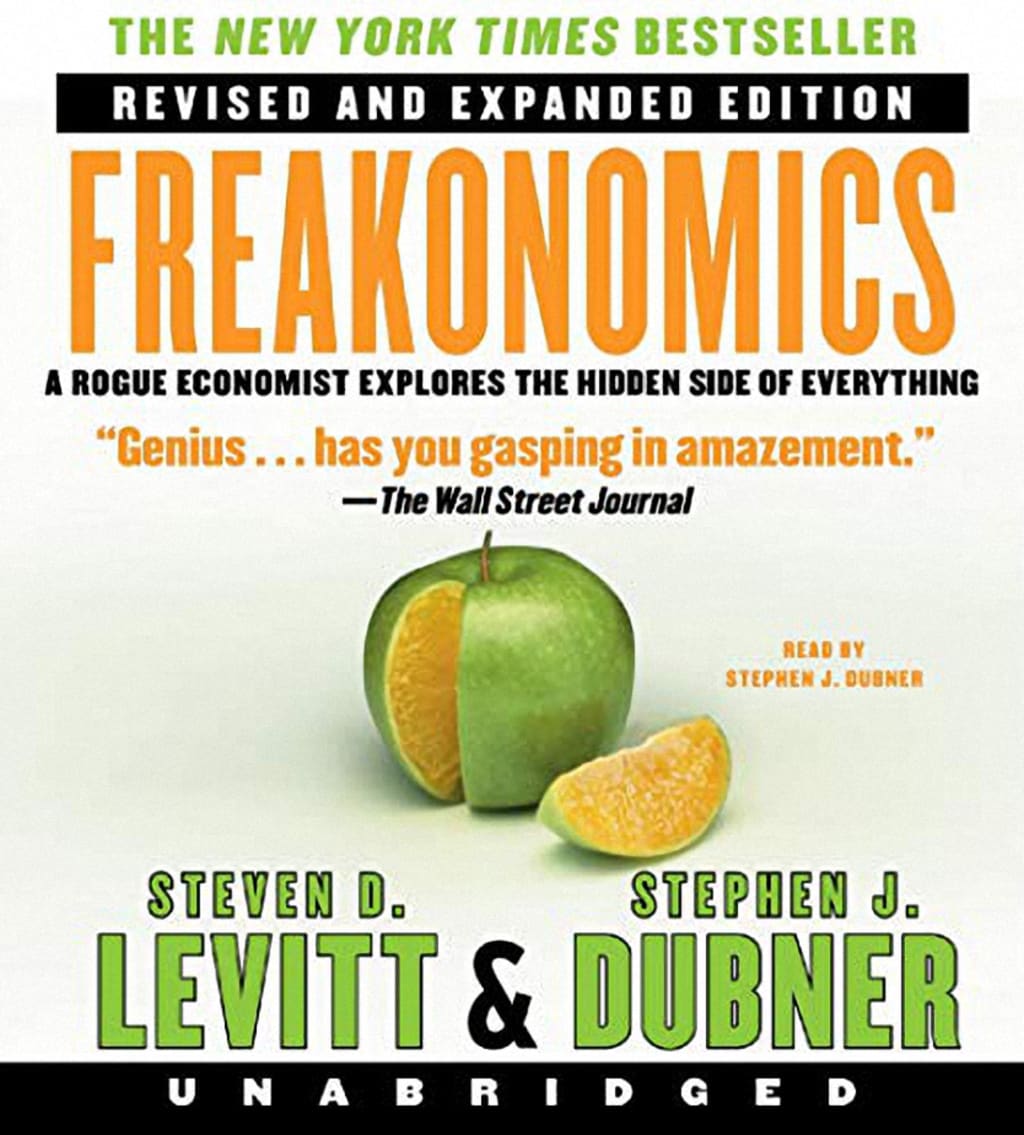Freakonomics
A Rogue Economist Explores the Hidden Side of Everything

Freakonomics is a book written by economist Steven Levitt and writer Stephen Dubner in which they investigate the hidden incentives, motivations, and repercussions that lie behind a wide variety of social patterns and occurrences. They exhibit Levitt's unusual yet insightful approach by using the lens of economics to themes such as cheating teachers and conspiring sumo wrestlers. In doing so, they discover the unseen factors that are affecting occurrences that appear to be unrelated to one another. Their captivating book deftly challenges commonly held beliefs about the way the world functions.
The authors use a narrative approach, investigating some of Levitt's most intriguing research findings as if they were a series of puzzles. For example, they evaluate the abrupt and significant decline in crime rates that occurred in the 1990s and discover that factors such as the legalization of abortion play a role that is disregarded by the majority of criminologists. The daring thinking of Levitt and the energizing style of Dubner make economics not just approachable but also exhilarating and enjoyable.
In alternating chapters, the book's narrators, Stephen J. Dubner and Steven D. Levitt, use an interesting conversational style of narration that is consistent with the spirit of the book. Their back-and-forth conversations and understated humor add vitality, making it simple for any listener to understand the sophisticated economic principles that are being discussed.
Incentivizing beneficial change through wiser institutions, rather than necessarily providing more financial incentive, is a central subject. As an illustration of how minor incentives can be more effective than significant punishments, Levitt presents the example of a tiny deposit as a disincentive for people to miss their scheduled medical appointments. The authors regularly question conventional knowledge, such as the idea that increasing the amount of money spent on education will lead to improved academic performance.
Although they have been met with controversy, Levitt's arguments against conventional remedies are supported by in-depth data analysis that is explained in simple words. He sheds light on realities that are paradoxical and, at times, uncomfortable, such as the fact that increasing police pay has no impact on lowering levels of corruption. However, Levitt's objective is constructive: to shed light on the reasons why, despite our best efforts, we are unable to solve issues.
By delving deeper than the obvious reasons, Levitt demonstrates how self-interest can drive behavior that appears to be motivated by altruism, and vice versa. For example, he thinks that parental fears over threats such as kidnapping, despite the fact that it is very uncommon, originate from a deeper evolutionary impulse. Even when they are startling, Levitt's findings force a reexamination of beliefs that have been held for a long time.
The authors retain a tone that is engagingly amusing despite the substantial subject matter, and their writing is easy to understand. They are able to make economics not only understandable but also fascinating, much like detective stories that contain twists and turns that are not anticipated. The reader will experience a number of "aha" experiences while reading this book.
Those who listen will develop a deeper understanding for the ability of economics to provide rational explanations for actions and occurrences that initially appear inexplicable. Freakonomics enlightens a wide range of topics, from choosing names for children to deceiving the Bagel Guy, and it illustrates how incentives lead us, often unconsciously. It gives one the intellectual tools to study the world in unorthodox but insightful ways, which is quite useful.
Levitt reveals the underlying benefits and motivations that lie behind the good, the evil, and the odd in society. His examples range from criminal networks to the Ku Klux Klan. Listeners who are interested in social science, ideas that defy common sense, and gaining new perspectives on the world will be captivated by Freakonomics since it is both intellectually stimulating and pleasantly entertaining.
By enrolling in a 30-day complimentary trial on Audible, participants are granted the opportunity to acquire two complimentary audiobooks as an initial incentive, so affording them the freedom to procure any desired literary work.There will be no financial burden on your part, but I will receive a modest commission.
Termination is permissible at any given moment. The ownership of books remains with the member, even in the event of cancellation. Please access the provided hyperlink by clicking on it.
The provided link directs to an Amazon webpage.





Comments
There are no comments for this story
Be the first to respond and start the conversation.